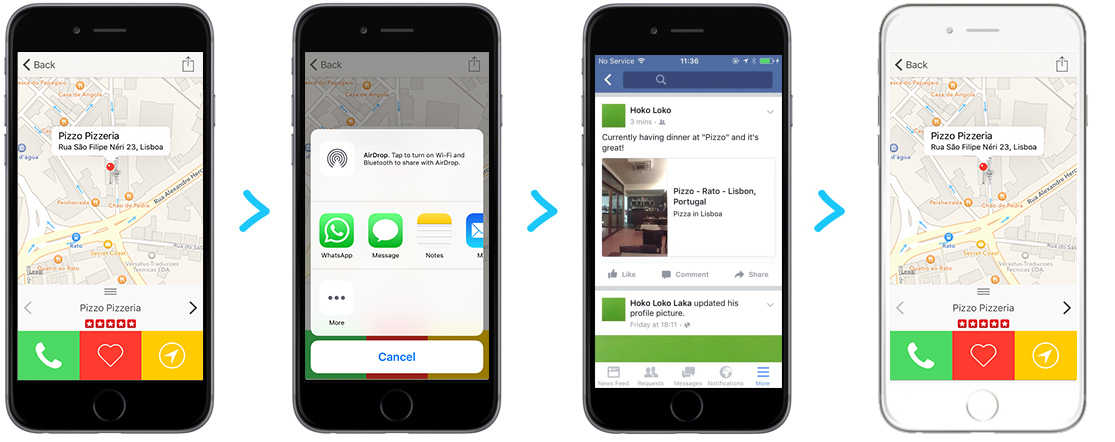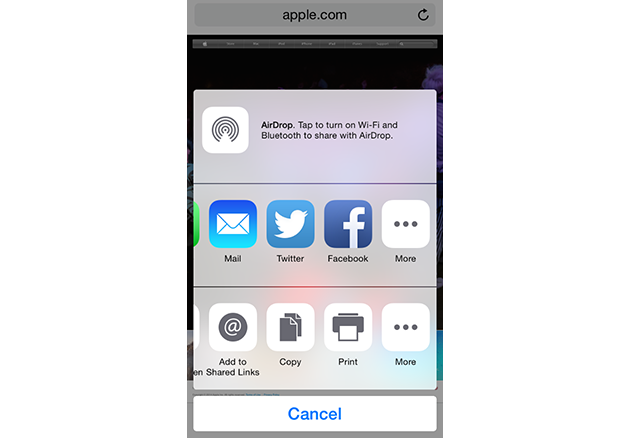Share on Social Networks
Let your users share your app’s content on social media like Facebook and Twitter and use smart links to drive traffic back into your app.

In the following sections we are going to learn how to share smart links using the operating system’s native share controllers.
Step 1: Sharing on social media
In this example, our app is a restaurant booking application where users can share with their friends where they are enjoying a nice meal. Share is done by using a smart link that redirects users to that specific restaurant inside the app.
Let’s start by creating a mobile deep link for this item using the deeplinkWithRoute method.
This is necessary so the app knows what to do when some other user opens the app through the link.
Next, we are going to encapsulate the deeplink inside a smart
link using the generateSmartlinkForDeeplink function.

Finally, we are going to share the post using iOS UIActivityViewController.
Thus, the user can pick the best Social Network app. Let’s have a look at the code needed
to generate and share the smart link:
- (IBAction)shareToSocialNetworksButtonTapped:(id)sender {
NSNumber *restaurantID = @(self.currentRestaurant.uniqueID);
HOKDeeplink *restaurantDeeplink = [HOKDeeplink deeplinkWithRoute:@"restaurant/:restaurant_id"
routeParameters:@{@"restaurant_id": restaurantID}];
// Create the smart link based on the deep link
[[Hoko deeplinking] generateSmartlinkForDeeplink:restaurantDeeplink success:^(NSString *smartlink) {
// Initialize a new iOS share sheet with your share message
NSString *shareMessage = [NSString stringWithFormat:@"Currently having dinner at %@ and it's great!", self.currentRestaurant.name];
// Assign the URL of the smart link
NSURL *smartURL = [NSURL URLWithString:smartlink];
UIActivityViewController *shareController = [[UIActivityViewController alloc] initWithActivityItems:@[shareMessage, smartURL]
applicationActivities:nil];
// And... it's ready! Let's present the share popup to the user
[self presentViewController:shareController animated:YES completion:nil];
} failure:^(NSError *error) {
NSLog(@"%@", error.description);
}];
}@IBAction func shareToSocialNetworksButtonTapped(sender: AnyObject) {
let restaurantID = String(currentRestaurant.uniqueID)
let restaurantDeeplink = HOKDeeplink(route: "restaurant/:restaurant_id", routeParameters: ["restaurant_id": restaurantID])
// Create the smart link based on the deep link
Hoko.deeplinking().generateSmartlinkForDeeplink(restaurantDeeplink, success: { smartlink in
// The restaurant Smart link was generated successfully. Let's share it.
if let smartURL = NSURL(string: smartlink) {
let shareMessage = "Currently having dinner at \(self.currentRestaurant.name) and it's great!"
// Assign the URL of the smart link
let shareController = UIActivityViewController(activityItems: [shareMessage, smartURL], applicationActivities: nil)
// And... it's ready! Let's present the share popup to the user
self.presentViewController(shareController, animated: true, completion: nil)
}
}) { error in
println(error.description)
}
}If the item shared through your app is also available on your website, we will automatically
parse your website and attach any metatag available to the smart link, like og:image,
og:description, image or any other present.
This way, when you include smart links in social media
posts you can have extra data like thumbnails and descriptions. Make sure you have a Web
platform and a Template configured. Check the documentation about
templates to know more.
Step 2: Handling smart links inside your app
When the user opens your app through a smart link, it’s up to you to present the appropriate view within your app. You also have to define what are the deep linking routes that your app is going to support.
Map routes using the deep linking module’s mapRoute:toTarget method
inside the application:didFinishLaunchingWithOptions: of your application AppDelegate subclass.
[[Hoko deeplinking] mapRoute:@"restaurant/:restaurant_id"
toTarget:^(HOKDeeplink *deeplink) {
NSString* productId = deeplink.routeParameters[@"restaurant_id"];
// Do something when deeplink is opened
}];Hoko.deeplinking().mapRoute("restaurant/:restaurant_id", toTarget: {
(deeplink: HOKDeeplink) -> Void in
if let productId = deeplink.routeParameters?["restaurant_id"] {
// Do something when deep link is opened
}
})This will map a restaurant/:restaurant_id route to an executable target block. This target
will always be executed when a deep link matching the route is opened in the user’s device,
e.g. opening hoko://restaurant/pizza. You can find more information about
Route Mapping in the
documentation.
Further more, we provide utility methods to help you handling smart links, like presenting the correct view or setting the root view, based on the route parameters, query parameters or metadata. Check the documentation about Deeplink Utilities to know more.
More information
Need to know more about this? You can find more information in the following pages:
Check our frequently asked questions or send us a message if you can’t find what you are looking for. We’re always glad to hear from you and answer all your questions.
